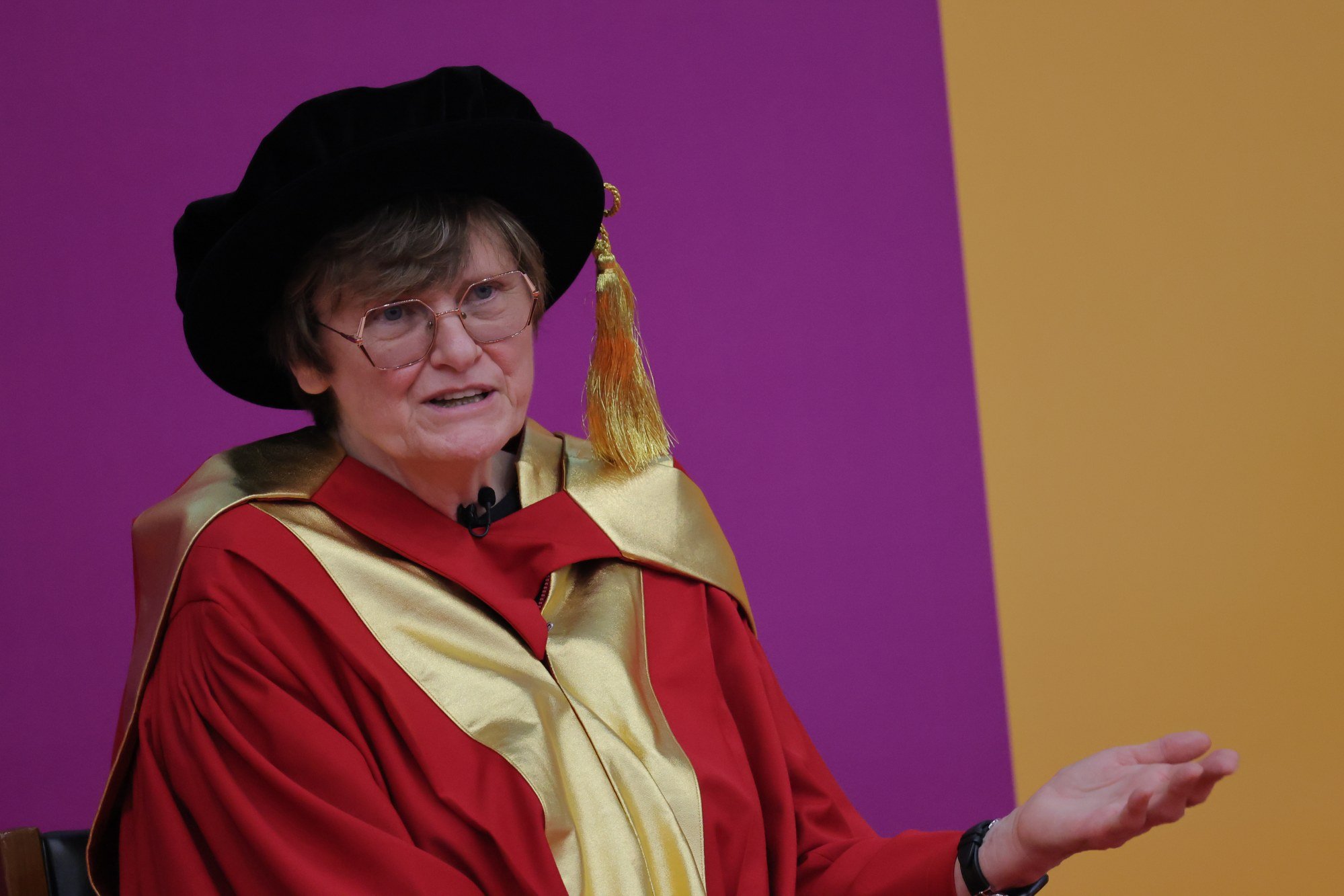
Pioneer of mRNA vaccine touts technology’s promise while in Hong Kong for award, recalls how Covid placed her in spotlight
- Hungarian-American biochemist Professor Katalin Kariko hopes mRNA science can be used for wound-healing and even on cancer
- In town to receive CUHK honorary doctorate of science, she shares her tumultuous research journey and her view on Hong Kong’s bid to become biotech hub
A scientist who laid the groundwork for Covid-19 mRNA vaccines has voiced hope for a future where drugs centred on similar technology could be used for healing wounds and to prevent a wide range of conditions, from cancer to heart diseases and allergies.
Professor Katalin Kariko, a Hungarian-American biochemist, did not expect that her research on messenger RNA, or mRNA, which started more than 30 years ago, could help develop vaccines which were crucial in the pandemic fight.
“I didn’t expect … I would be in the spotlight,” said Kariko, 68, who was in Hong Kong on Friday to receive an honorary doctorate of science from Chinese University for her life-saving work.

Widely administered worldwide for Covid-19, mRNA vaccines use messenger RNA molecules to teach the body to generate specialised proteins and activate immune cells to target the virus.
Kariko, currently a professor at Hungary’s University of Szeged and an adjunct professor at the University of Pennsylvania, explained that RNA, found in all living cells, could also help produce a protein which could contribute to healing.
“I expected that mRNA will be useful for certain things. Actually I imagine that everybody will have in their freezer some kind of RNA … mostly for wounds,” Kariko said. “Maybe they burned their hands when cooking … You can apply [the RNA] and accelerate healing.”
US drug giant Moderna is in Hong Kong. What are its plans?
First discovered in 1961, mRNA, a type of RNA, works like a messenger carrying important instructions that direct parts of cells responsible for protein production. Kariko and colleague Professor Drew Weissman at Pennsylvania found a way to modify mRNA, enabling the development of related vaccines.
With the use of mRNA technology, vaccines could also be developed much quicker, Kariko said.
In 2020, pharmaceutical company Moderna started clinical trials for the Covid-19 mRNA vaccine just two months after China shared the genetic sequence for the coronavirus. BioNTech also partnered with Pfizer to develop vaccines based on discoveries by Kariko and her team.
She recalled she “choked” and “almost cried” when she saw people around her lining up for vaccination in late 2020, less than a year after the pandemic broke out.
But despite the quick development, there had also been complaints of side effects from mRNA vaccines. There were reports of myocarditis – or inflammation of the heart muscle – among Hong Kong residents, especially male adolescents, who had taken the mRNA-based BioNTech shots.
Moderna says bivalent Covid vaccine approved for Hong Kong use
The cases prompted recommendations from the government’s medical advisers that BioNTech jabs should be administered on the thighs for children and adolescents to lower the risk of heart inflammation.
“Every medicine has side effects,” Kariko noted, saying the issues came from the adjuvant, an ingredient used in vaccines that helps create a stronger immune response in recipients.
“That adjuvant increases inflammation or activates the immune system,” she said.
Kariko agreed that Covid-19 offered the public a chance to understand mRNA and accelerated the development of the technology, even though research on its application for the prevention or treatment of various diseases had begun long before the pandemic.
Various clinical trials are under way to understand the potential of mRNA in therapeutics. Vaccines against pancreatic cancer and melanoma, as well as treatments for heart disease and allergies to peanuts and dust mites, are among the many projects undertaken by scientists worldwide.
While Kariko has been honoured with numerous international awards for her work, her career path has been a bumpy one as she had earlier struggled to get research funding. But she voiced gratitude for the hiccups encountered along the way.
“I say thanks to the people who tried to make my life miserable, because they made me stronger … and resilient,” she said, crediting her migrant background in the US for giving her the determination to never quit on what she had worked hard for.
Hong Kong has dumped 50,000 Covid vaccine doses since start of jabs drive
Covid-19 has shone the spotlight on Kariko, and she hopes to make use of the opportunity to promote science.
“I feel a responsibility,” she said, pointing to the chance to pique young people’s interest in her field. “I want them to see that science is important and to be a scientist is an exciting thing.”
With Hong Kong seeking to become an international biotech hub, Kariko said the government should consider offering “high-quality, affordable childcare” so female scientists could continue working.
“We need the women and they won’t give up because they want to [start families],” said Kariko, whose daughter is US Olympic rowing champion Susan Francia. She drew similarities in science to her daughter’s sport, in which athletes row backwards and do not see the finish line.
“I don’t even see whether I am going [in] the right direction. But I am pulling hard,” she said.

